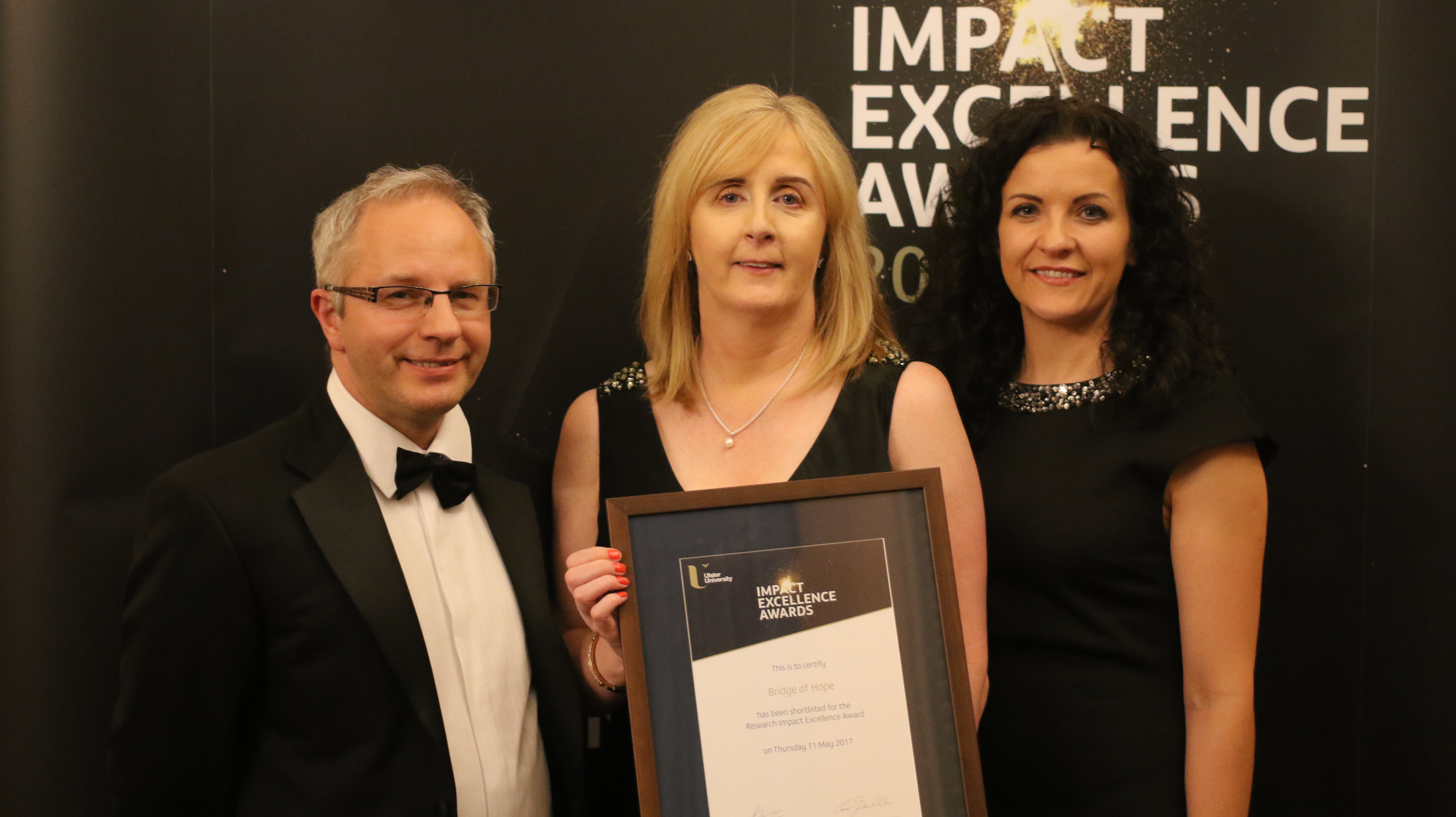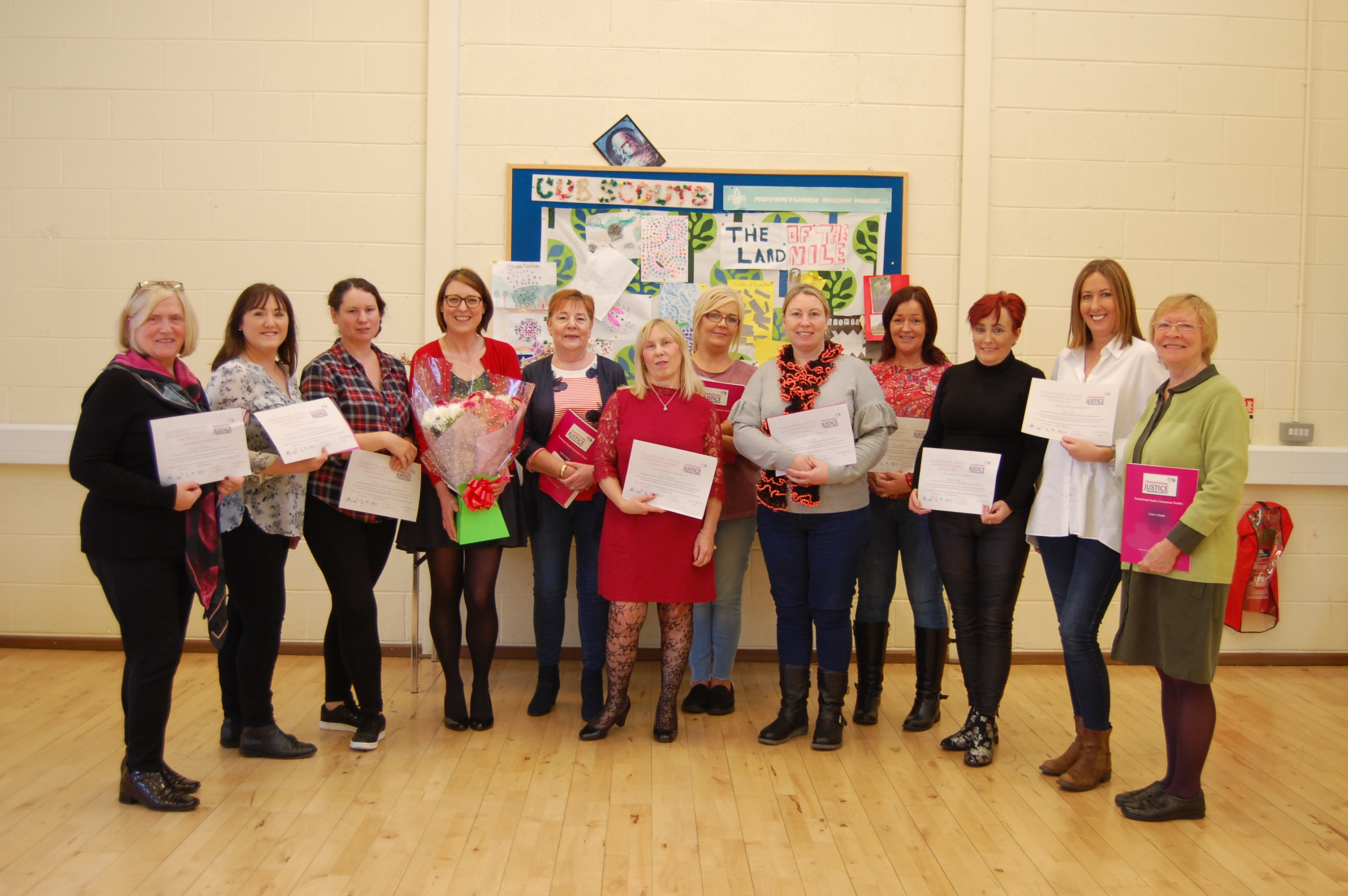
Picture Caption: Ulster University Impact Excellence Awards 2017 Belfast Harbour Commission: TJI Director Rory O’Connell, ACT Head of Victims & Mental Health Services Irene Sherry and TJI Research Manager Lisa Thompson. Bridge of Hope was shortlisted for its partnership work with TJI on the Grassroots Toolkit.

GRACE Transitional Justice Grassroots Toolkit Group with Áine Magee Bridge of Hope Legacy Coordinator, receiving their certificates from Eilish Rooney Senior Lecturer Ulster University and TJI November 2017.
Bridge of Hope supports victims and survivors and their families to engage in legacy issues through delivery of conflict legacy programmes. This work is much needed at grassroots level where conflict-deaths and disruption was highest. The impact of the conflict in Belfast was extremely high with 42% of all fatalities taking place in the city. Disruption on an individual and communal scale was compounded by equally high levels of injuries, house arrests, interface violence, internment, bombings and raids. The job of addressing the legacy of the conflict remains and therefore an appetite for dealing with the past is high.
Over the last decade substantial pieces of research, cross community confidence building and dialogue sessions have been channelled through Bridge of Hope which, with the help of participants, have undoubtedly helped steer wider society onto a path of greater awareness, reconciliation and healing. Click on the links below for more details about some of this work:
- Making Sense of the Past in the Present
- Who Am I?
- Transitional Justice Grassroots Programme in partnership with Transitional Justice Institute at Ulster University
Toolkit Overview: Initiated by Bridge of Hope back in 2011 the Transitional Justice Grassroots Toolkit Programme worked with Mount Vernon, Tigers Bay and New Lodge and was highly successful. Another highlight came in 2012 with delivery to Falls Women’s Centre and Shankill Women’s Centre. The Toolkit work is a partnership with the Transitional Justice Institute (TJI) at Ulster University and in 2017 this collaboration was nominated in Ulster University’s Impact Excellence Awards. To date nearly 450 individuals have studied and explored the Toolkit including people from across Belfast and County Tyrone, students and academics, police officers, community groups, ex-prisoners, NGOs, victims and survivors groups and funders, international stakeholders & students from Kosovo, Kenya, Afghanistan and Colombia.
As we see it, the Toolkit Programme empowers individuals and communities affected by conflict & transition to address the legacy of the past in a programme that is guided by principles of equality and human rights. It is centred on capturing lived experiences through five key themes i.e. institutional reform, truth, reparations, reconciliation and prosecution/amnesty. Whilst using the framework the Toolkit prompts and encourages respectful and reflective discussion. In this way the Toolkit creates a potentially transformative space for conversations that focus on how the local transition is evolving from conflict but also what views we hold about its current and future trajectory.
The Grassroots Toolkit Trainer’s Manual is endorsed by Paul Seils, Vice President of the International Centre of Transitional Justice (ICTJ) in New York and the Victims & Survivors Service Chief Executive Margaret Bateson. It is also supported by SF and DUP Junior Ministers. As a case study the Toolkit partnership work helped Ulster University gain a first class ranking in the Research Excellence Framework (REF) for impact (2014). It has been described by victims and survivors as an ‘enabler’ of critical and necessary conversations about dealing with the past. Here are a few comments from participants:
- Realising the wealth of knowledge that came from the group. We learned so much about what transitional justice means across the world, particularly the North of Ireland. I learned and appreciated the shared experiences.
- It has enabled me to have open and critical conversations about transition and justice in North Belfast. This programme brought people from all walks of life together and gave a great wide and open view of what and how the conflict affected them.
